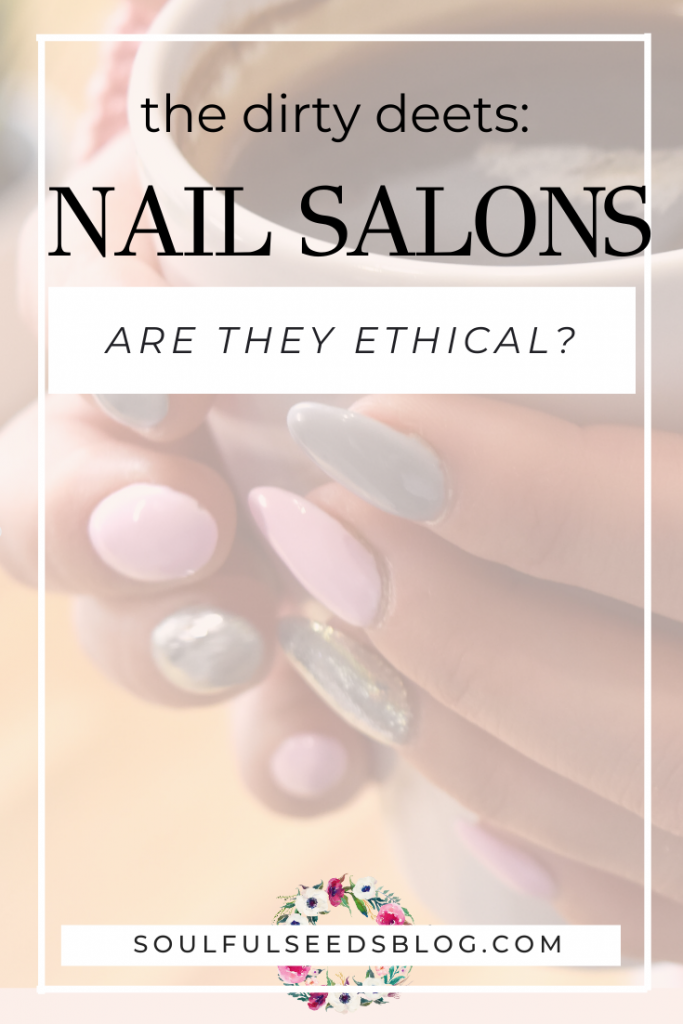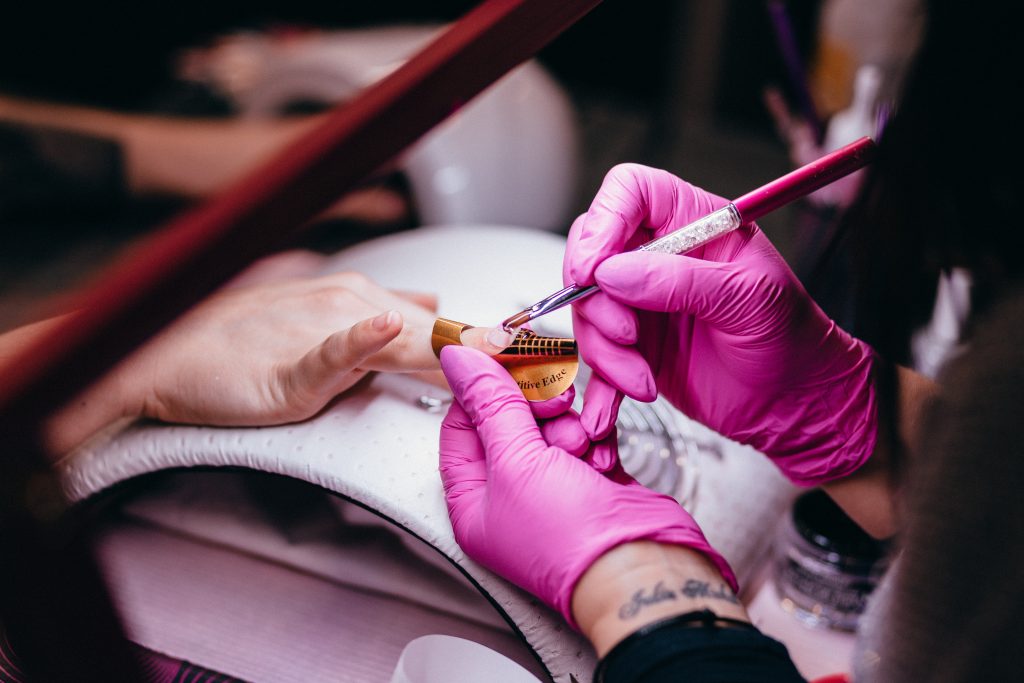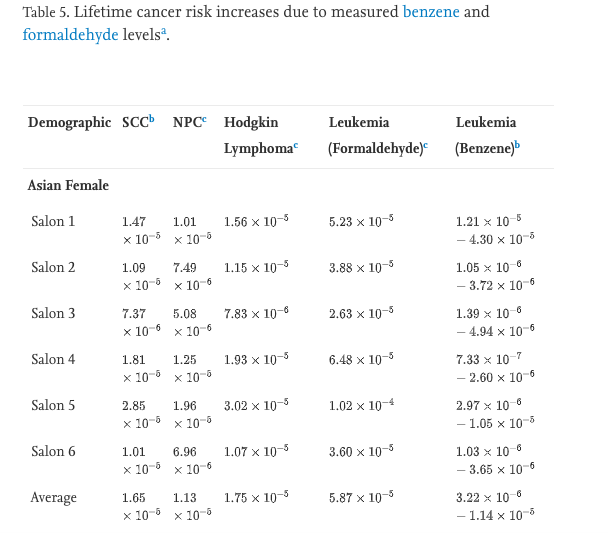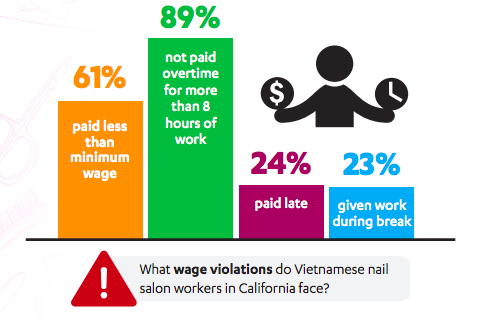The past few months, I had a brief stint with getting my nails done. I hated most parts of the process- from the chemical stench that overwhelmed me when walking in the door of the salon to the withering up of my credit card when swiped through the register. Even still, I went back again and again because the end result was something that made me feel good. Having my nails done makes me feel like a put-together princess and I won’t deny it.

All the things that I recognized I hated about getting my nails done seemed to be factors that could hurt other people.
Today, I wanted to explore the truth behind most American nail salons (excluding natural spas). This article in no way is intended to shame you for getting your nails done (heck, I can relate to getting them done in the past), but instead is intended to spread knowledge about an industry not many people know about.
I’m not in the position I once was in where I feel insanely guilty just for treating myself… but I still feel guilty if I feel like I might be contributing to something that is dependent on the harming of someone else. As good as I felt getting a new set of freshly manicured nails, I always left the salon brimming with a sense of queasiness and guilt.
Worker Vulnerability + Exploitation

I sat down at the table, my hands folded in semi-warm towels and my eyes wandering to the TV screens mounted on the walls. My attention quickly waned due to the mediocrity of pop music videos and I looked down at the nail salon worker sitting next to us. I couldn’t see much of her face, which was covered with a mask, other than the massive black eye she donned.
My heart immediately sank. I know that there was a chance the black eye happened from taking a fall or an accident, but all I wanted to do is reach out and ask if she was okay and if anyone had hurt her.
As an intern at an anti-human trafficking agency and the president of my school’s anti-human trafficking club, I have been to dozens and dozens of trainings about signs of human trafficking or interpersonal violence and what to look out for.
The reticent nature of the woman sitting next to us along with her obvious injury inevitably brought my mind to the possibility that she might be a victim of some sort of violence and/or abuse.
She turned to the lady filing my nails and said something in Vietnamese.
Almost all nail salon workers are immigrants, from Vietnam, China, Nepal, Tibet, Latin America, South America, or former Soviet Bloc countries. Close to 80% of nail-salon workers that are documented are foreign-born, half of whom have low English proficiency.
The most common group of workers are Asian (76%), with Vietnamese nail salons being over half of all U.S. salons.
Not speaking English is a vulnerability in workers that is often exploited by owners or traffickers. When people don’t speak a country’s main language, they often are not aware of their rights and cannot communicate well with others.
Recommended-> Labor Exploitation in Fast Fashion
Trafficking?
We’ve explored the vulnerabilities that many nail technicians have. Now, lets look at the studies that have proven the exploitation of these vulnerabilities by business owners.
A groundbreaking New York Times expose went to various nail salons in New York
Numerous nail technicians were interviewed for the story, and each one’s narrative of grossly low pay was far from atypical.
I was particularly moved by the story of Ms. Ren, who worked for nearly three months without pay at a salon in Huntington Station, N.Y.
After months of unpaid labor, she was finally notified that she would be receiving payment… but it was a meager amount of less than $3 an hour.
This kind of witholding of pay and under minimum wage salary falls under the legal definition of trafficking.
Does trafficking in nail salons exist outside of the Big Apple?
I have reason to believe so.
Oakland, CA
In July of 2018, the Oakland Labor Commissioner’s Office issued over $1.2 million in wage theft citations to a nail salon for “misclassifying and failing to properly pay 36 workers.” The investigation done by the office revealed that the workers at the nail salon were not paid an hourly rate or paid overtime even if working up to 50 hours per week.
The misclassification of employees as independent contractors, as done by the nail salon referenced above, allows the owner of a business to subvert the Fair Labor Standards Act and not pay workers minimum wage and overtime pay protection. For someone to actually be an independent contractor, they must be free of control from a hirer, which is certainly not the case in nail salons.
Toxicity of Nail Salons
In addition to the heinous labor abuses that are rampant within the nail industry, there are a host of health concerns associated with working in the industry.
The Occupational and Safety Hazards Administration website lists a host of chemicals frequently found in nail salons that are harmful to humans:
- Acetone (nail polish remover): headaches; dizziness; and irritated eyes, skin, and throat.
- Acetonitrile (fingernail glue remover): irritated nose and throat; breathing problems; nausea; vomiting; weakness; and exhaustion.
- Butyl acetate (nail polish, nail polish remover): headaches and irritated eyes, skin, nose, mouth, and throat
- Dibutyl phthalate (DBP), (nail polish): nausea and irritated eyes, skin, nose, mouth, and throat. Long-term exposures to high concentrations may cause other serious effects.
- Ethyl acetate (nail polish, nail polish remover, fingernail glue): irritated eyes, stomach, skin, nose, mouth, and throat; high levels can cause fainting.
- Ethyl methacrylate (EMA), (artificial nail liquid): asthma; irritated eyes, skin, nose, and mouth; difficulty concentrating. Exposures while pregnant may affect your child.
- Formaldehyde (nail polish, nail hardener): difficulty breathing, including coughing, asthma-like attacks, and wheezing; allergic reactions; irritated eyes, skin, and throat. Formaldehyde can cause cancer.
- Isopropyl acetate (nail polish, nail polish remover): sleepiness, and irritated eyes, nose, and throat.
- Methacrylic acid (nail primer): skin burns and irritated eyes, skin, nose, mouth, and throat. At higher concentrations, this chemical can cause difficulty breathing.
- Methyl methacrylate (MMA), (artificial nail products, though banned for use in many states): asthma; irritated eyes, skin, nose, and mouth; difficulty concentrating; loss of smell.
- Quaternary ammonium compounds (disinfectants): irritated skin and nose and may cause asthma.
- Toluene (nail polish, fingernail glue): dry or cracked skin; headaches, dizziness, and numbness; irritated eyes, nose, throat, and lungs; damage to liver and kidneys; and harm to unborn children during pregnancy.
Real People, Real Problems
A study called “Occupational exposure to volatile organic compounds and health risks in Colorado nail salons” looked at six different nail salons and the real health impacts of the profession on nail salon workers there.

The scientists conducted individual VOC exposure, distributed comprehensive health surveys, and tracked air quality for levels of known carcinogens in the salons.
70% of nail technicians self-reported experiencing at least one of the health symptoms listed as a result of work conditions. Of those 70%, 57% reported experiencing multiple of the symptoms.
The study then used Cancer Risk estimates associated with Formaldehyde exposure from the EPA and the CDC to project risks based on the nail technicians’ exposures.

Takeaways
I hope this article was enlightening. As previously stated, I do not intend to shame anyone for getting their nails done. Instead, I hope this article makes you think twice about what you partake in and who it might be affecting.
As always, I welcome questions, comments, and emails! Love to connect with you guys.

